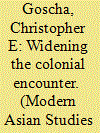|
|
|
Sort Order |
|
|
|
Items / Page
|
|
|
|
|
|
|
| Srl | Item |
| 1 |
ID:
079215


|
|
|
|
|
| Publication |
2007.
|
| Summary/Abstract |
The renaissance in intelligences studies over the last two decades has offered new and exciting insights into war, societies, ideologies, institutions, and even cultures and mindsets. Yet, its geographical reach has remained largely limited to the West or Western cases. We still know relatively little about intelligence services and their roles in the making of postcolonial nation-states in Africa or Asia, much less their perceptions of the world outside. This article uses the case of communist Vietnam during the First Indochina War to provide a general overview of the birth, development, and major functions of the Democratic Republic of Vietnam's Public Security and Intelligence services in a time of decolonization. It then examines three Vietnamese case studies as a way of considering wider themes relating to the question of intelligence and decolonization. In wider terms, this article seeks to contribute to the expansion of intelligence studies on the non-Western,'postcolonial' world
|
|
|
|
|
|
|
|
|
|
|
|
|
|
|
|
| 2 |
ID:
117071


|
|
|
|
|
| Publication |
2012.
|
| Summary/Abstract |
This article examines how and why the French Orientalist, Paul Mus, became one of the leading critics of the Indochina War and an advocate of French decolonization. Most studies of Western Orientalism tend to adopt Saidian approaches to demonstrate the degree to which Western scholars operated from within the confines of the wider colonial project and were influenced by it. Mus does not escape from this critique. However, like Jacques Berque in North Africa, Mus was one of a handful of French Orientalists who not only grew up and pursued their research in the Empire, but also became deeply involved in trying to understand the rising tide of colonial nationalism, the nature of French colonialism and the meaning of decolonization in new ways for the time. This article considers how war, and in particular the experience of violence in the colonial context, shaped Mus's understanding of colonialism, his conception of humanity, and influenced his post-war writings in ways that distinguished him from colonial humanists in charge of the Republican Empire and Orientalists who continued to operate within the colonial power structure. In late 1949, Paul Mus left his position at the head of the French Colonial Academy to renew his pre-war academic career. However, unlike scores of social scientists who had also experienced war, Mus placed that very experience at the centre of his post-war scholarship.
|
|
|
|
|
|
|
|
|
|
|
|
|
|
|
|
| 3 |
ID:
079216


|
|
|
| 4 |
ID:
093095


|
|
|
|
|
| Publication |
2009.
|
| Summary/Abstract |
Relying on three inter-Asian colonial debates from French Indochina, this paper attempts to widen our analytical approach to the study of colonialism in Indochina beyond the 'colonizer'-'colonized' opposition by factoring in the relationships among the diverse Asian colonized living within the colonial state without downplaying the important role Western colonialism played in transforming those very relationships or being affected by them. The French Indochinese case is helpful, for it suggests that inter-Asian connections did anything vanish, but rather intensified because of the colonial experience. Numerous Lao, Khmer, Vietnamese and Chinese subject elites continued to engage each other and the French in fascinating and sometimes heated debates about the political, legal, cultural and economic place each group held in French Indochina - or did not want to hold. This directly affected how they came to interact with one another in new ways, essential to understanding the complexity of the colonial encounter at the time and can provide new insights into post-colonial and international history. Lastly, this wider approach to studying the colonial encounter allows us to view the French side of the colonial equation from a new vantage point.
|
|
|
|
|
|
|
|
|
|
|
|
|
|
|
|
|
|
|
|
|